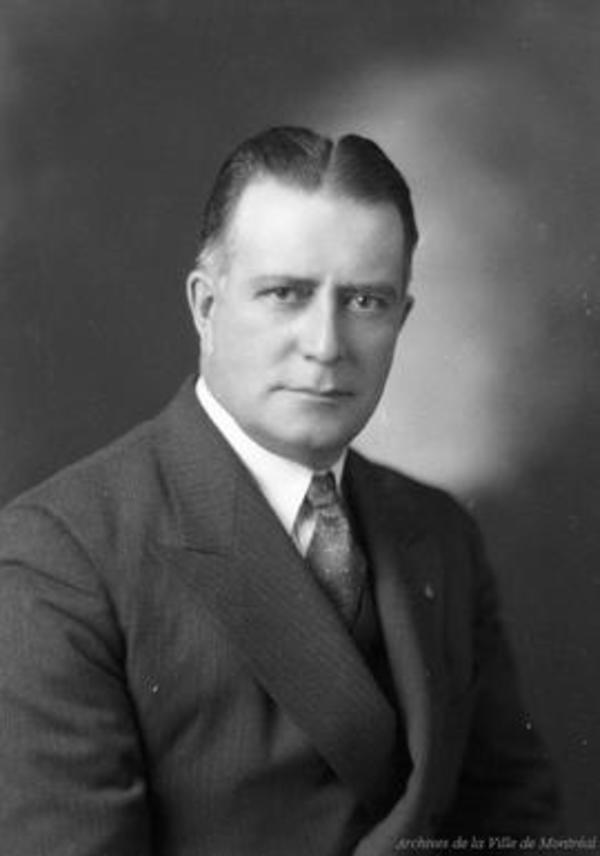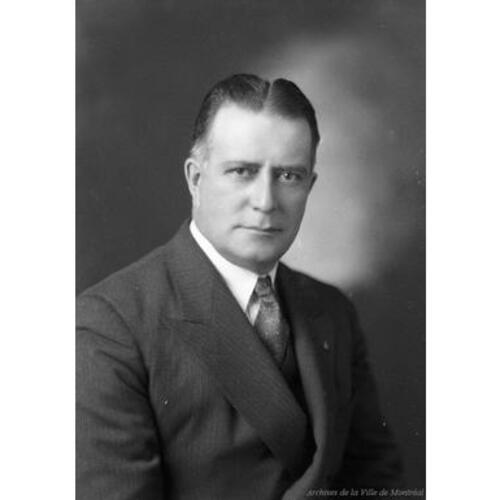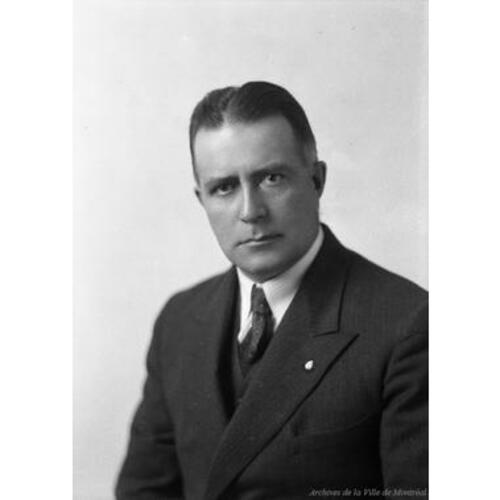
Source: Link
BRUNET, GEORGES-RAOUL, pressman, trade-union leader, civil servant, and politician; b. 4 Dec. 1881 in Saint-Clet, Que., son of George Brunet, a joiner, and Angèle (Marie-Angèle) Lecompte; m. 26 June 1906 Alida Huneault in Saint-Jean-Baptiste parish, Montreal, and they had two daughters and two sons; d. 11 April 1939 in the same city following a long illness.
Georges-Raoul Brunet was a young boy when his father moved the family to Chicago, where he found work. Georges-Raoul attended a public school there, and then, at the age of 12, continued his education in Vankleek Hill, Ont., where he learned the trade of pressman in the printing shop of the Eastern Ontario Review. Having settled in Montreal with his family from the age of 15, he pursued his training at the Librairie C.‑O. Beauchemin et fils for about three years. For a large part of his life, he was to practise his trade in the press rooms of, among others, C. R. Corneil and W. J. Kearns, the daily newspapers the Montreal Herald and La Presse, and lastly the Mercantile Printing Company, owned by the union leader Gustave Francq*.
Brunet began his union career in 1901 when he joined Local 52 of the International Printing Pressmen and Assistants’ Union of North America. While president of this local from 1904 to 1907, he attracted the attention of the leaders of its international body, who appointed him labour organizer for the province of Quebec in 1908. From 1922 to 1938 he was the union’s general vice-president and representative for all of Canada.
Over the years Brunet held numerous positions within the Montreal Trades and Labor Council. He was corresponding secretary from January 1907 to September 1908 and from August 1909 to the summer of 1911, and then president for two terms, which ran until the summer of 1912. He was treasurer in 1913 and French recording secretary from January 1914 until his resignation the following July. A member of the management committee in 1912, 1913, 1926, 1927, and 1937, he became president once more in September 1934 on the death of John Thomas Foster and was re-elected the following year. On several occasions he represented the pressmen at the annual meetings of the Trades and Labor Congress of Canada. Between 1909 and 1929 he missed only three meetings.
On the international scene, Brunet was the fraternal delegate of the Trades and Labor Congress of Canada at the Trades Union Congress held in Edinburgh in 1927. During his trip to Europe he represented this Canadian body at other trade-union gatherings, including those of the Confédération Générale du Travail and the International Federation of Trade Unions, both held in Paris. He would do so again in November 1936 in Tampa, Fla, at the conference of the American Federation of Labor, for which he had been the provincial organizer from 1913 to 1915.
Brunet took an active interest in politics. He ran as a candidate for the Labour Party in the riding of Montreal-Laurier in the 1912 provincial election. Facing two opponents, Napoléon Turcot, a Liberal, and Alban Germain, a Conservative, he finished third with 16 per cent of the vote. He had better luck in 1932. On 4 April he was elected municipal councillor for Saint-Eusèbe ward, in Montreal. Having become a Liberal, along with many militants and union leaders after the decline of the Labour Party and the return to a degree of economic prosperity in the 1920s, he defeated Alfred Mathieu. The latter, a candidate on the team of outgoing mayor Camillien Houde*, had been in office for five years and, like Brunet, had already been president of the Montreal Trades and Labor Council. Brunet held the office of acting mayor. Ill health prevented him from seeking another term in 1934. He entered politics again under the Liberal banner for the 1936 provincial election. Candide Rochefort won easily, obtaining twice as many votes as Brunet.
Owing to his knowledge of the working class, Brunet had been named inspector of wages for the provincial government in 1915. His appointment to the newly created post did not, however, receive unanimous approval. Up to this point he had been an organizer for international unions, and therefore received the support of the Montreal Trades and Labor Council, but not of the Central Trades and Labor Council of Montreal, which was opposed to international trade unionism in Canada. The job, which he held until the spring of 1922, was in all likelihood a part-time position.
In April 1934 Brunet found employment in the complaints department of the City of Montreal, at an annual salary of $1,800. He was suspended in November 1935 and dismissed in December for having actively participated in the provincial election campaign on behalf of candidates of working-class origin: Liberal labour minister Charles-Joseph Arcand, in Maisonneuve; David Wolfe of the Labour Party, in Montreal-Laurier; and, especially, the Liberal Gaspard Fauteux, in Montreal–Sainte-Marie.
In July 1934 Brunet had served as an arbitrator on the conciliation and arbitration council of the Quebec labour ministry in the dispute involving the federated section No.19397 of the Gas Union workers and the Montreal Coke and Manufacturing Company of LaSalle (Montreal).
Throughout his career, Georges-Raoul Brunet defended workers’ interests. He had held various offices in his local union but also in professional and territorial trade-union organizations. He tried his hand at politics by running in various elections, eventually becoming a city councillor. As a provincial and municipal civil servant he also helped improve the lot of union members.
BANQ-CAM, CE601-S17, 4 déc. 1881. FD, Cimetière de l’Est, Repos Saint-François-d’Assise (Montréal), 13 avril 1939; Saint-Jean-Baptiste (Montréal), 26 juin 1906. VM-SA, VM74, procès-verbaux du comité exécutif, 10 avril 1934, 29 nov., 17 déc. 1935. Le Devoir, 12 avril 1939. Labor World (Montreal), 25 April 1931; 14 May, 23 July 1932; 27 June 1936; 15 April 1939. La Presse, 27 avril 1912; 19, 20 nov. 1915; 9, 27, 29 avril 1922; 23 mai 1925; 9 juill. 1927. Que., National Assembly, “History”: www.assnat.qc.ca/en/patrimoine/index.html (consulted 29 Dec. 2015) BCF, 1926: 324; 1933: 141. “G.‑R. Brunet est mort,” Canadian Congress Journal (Ottawa), 18 (1939), no.4: 39. Que., Treasury Dept., Statement of the public accounts, 1918–20; Parl., Sessional papers, 1935 (general report of the minister of labour of the prov. of Que., 1934–35).
Cite This Article
Bernard Dansereau, “BRUNET, GEORGES-RAOUL,” in Dictionary of Canadian Biography, vol. 16, University of Toronto/Université Laval, 2003–, accessed December 31, 2025, https://www.biographi.ca/en/bio/brunet_georges_raoul_16E.html.
The citation above shows the format for footnotes and endnotes according to the Chicago manual of style (16th edition). Information to be used in other citation formats:
| Permalink: | https://www.biographi.ca/en/bio/brunet_georges_raoul_16E.html |
| Author of Article: | Bernard Dansereau |
| Title of Article: | BRUNET, GEORGES-RAOUL |
| Publication Name: | Dictionary of Canadian Biography, vol. 16 |
| Publisher: | University of Toronto/Université Laval |
| Year of publication: | 2017 |
| Year of revision: | 2017 |
| Access Date: | December 31, 2025 |




